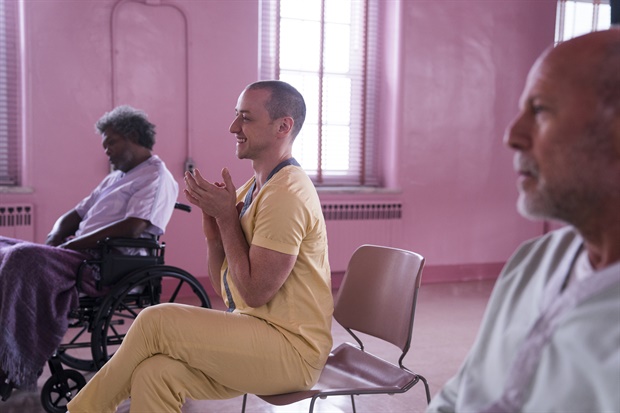For years, Unbreakable has been revered by many, some even calling it better than M. Night Shyamalan’s directorial debut The Sixth Sense. Debatable as that may be, none can deny that after a bit of a career downfall, it was revisiting the Unbreakable universe with Split that solidified his comeback among audiences. Fans rejoiced when they saw Bruce Willis’ cameo at the end of the latter, as that demonstrated how it fit into the larger world. And they rejoiced even more when Shyamalan announced Glass, the third and final chapter to this trilogy we didn’t even know we wanted!

A True Superhero Film
This unexpected trilogy developed in a truly unique manner. Unbreakable was more of a slow paced character drama, while Split was styled like a horror/thriller, and now Glass concludes the story like the comic book film the previous two knew they could be. The story begins a mere three weeks after the events of Split as Kevin Wendell Crumb aka “The Horde” (James McAvoy) attempts to replicate his ritual sacrifice with a group a cheerleaders and David Dunn aka “The Overseer” (Bruce Willis) roams the streets of Philadelphia as a vigilante hidden in the shadows. His now grown son Joseph (Spencer Treat Clark) acts as his eyes and ears. We spent the entire first film seeing him realize his heroic potential and it’s legitimately satisfying to see him in full action.

Soon, the two find themselves arrested and handed over to the care of Dr. Staple (Sarah Paulson) in a psychiatric facility, one which has housed the infamous Elijah Price aka “Mr. Glass” (Samuel L. Jackson) since the events of Unbreakable. Staple’s psychiatric specialty is in “superhero delusion”. And she spends a great deal of time trying to get David and Kevin to see that there are perfectly rational explanations for everything and that they are in fact not superhuman. All the while a catatonic Elijah sits heavily medicated, merely biding his time before he unleashes his master plan.

As far as pacing goes, the entire first act is very well put together. It helps set the stage for what will be the ultimate showdown later. The second act is where things really slow down. The scenes with Dr. Staple trying to reason with her patients are interesting, as she even gets some of Kevin’s more zealous personalities (like Dennis) to doubt if “The Beast” is truly supernatural. We also see the return of Casey Cooke (Anya Taylor-Joy) who visits Kevin in the facility.
At first, it seems quite strange that she would want anything to do with her previous captor, but she has a fondness for some of his more naïve and friendly personalities, like Hedwig, Barry, and Kevin himself. Elijah’s mother (Charlayne Woodard) shows up every week to see her son, and even Joseph turns up to try and convince Dr. Staple that his father is a hero and not a dangerous vigilante. The trio of supporting characters are interesting in their own right, but part of what slows down the second act is that the film isn’t really sure what to do with them. However, it all culminates together in the excitingly brilliant climax, and all the pieces fit together suddenly.

The Meeting of the Legends
One of the most fun aspects of the film is seeing these characters we’ve become fascinated with interact with each other. Samuel L. Jackson even stated in an interview that one of the most enjoyable experiences was doing a scene with James McAvoy and watching him switch personalities so fluidly in the same take. And for everyone who’s ever wondered whether David Dunn or the “The Beast” is stronger, here they’ll get their answer.

In some ways, Glass evokes the same excitement that a Marvel crossover would. But not to be mistaken with a Marvel adaptation, this film is very much its own entity. Yes it feels more like a comic book story than Unbreakable or Split, but it’s still very much grounded in the real world. Much like how Christopher Nolan set his Dark Knight trilogy in “the real world”, Shyamalan successfully suspends our disbelief about superpowers, and keeps the story just within the fringe of what’s possible.
Shyamalan Back for Good?
Compared to a lot of his previous work, it’s quite clear that Shyamalan has learned a thing or two from older mistakes. Sure, Glass still has the occasional use of awkward and clunky dialogue, but it’s nowhere near as rampant as it once was. Another common criticism is that his films have an air of pretentiousness to them, as if they believe they are so much smarter and more profound than they are.
And while there’s a bit of that with Glass, it’s much more fitting here. Elijah’s constant references to how his actions fit into the narrative of a comic book come off much more naturally than all the storytelling references in Lady in the Water, because his whole character is based around this obsession. And while his character may be pretentious, the film itself deflects it by allowing David’s reluctant hero to be the foil to the zeal from Elijah and “The Beast”.

There are of course a few twists (which won’t be spoiled) because it wouldn’t be a Shaymalan film without any. They don’t hold a candle to the ones we saw in Sixth Sense or Unbreakable, in fact some of them are downright predictable. But the point of the film was never about surprising us with a twist. Rather, it’s meant to be the ultimate finale to a story that made us wonder whether superhumans could exist in our real world. And in that respect, Shyamalan pulls it off perfectly!
Overall, Glass is well acted, a bit slow in the middle, but every bit of exciting for fans of the first two films. It’s a very different kind of superhero story, but in a world oversaturated by cinematic universes, it’s the perfect realistic take on a subject that is usually pure fantasy.




